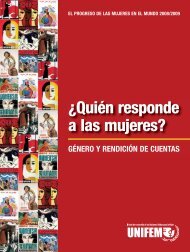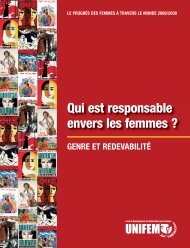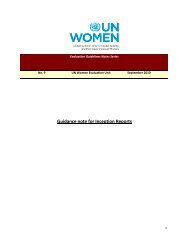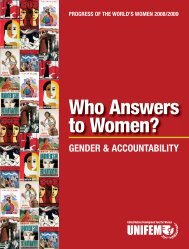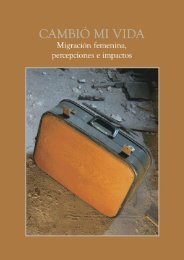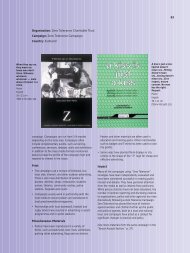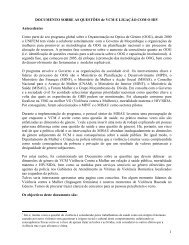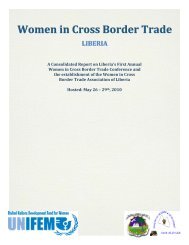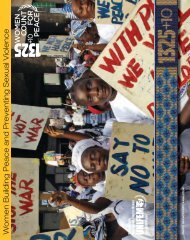UNIFEM/Avon Summit for a Better Tomorrow - Speeches - UN Women
UNIFEM/Avon Summit for a Better Tomorrow - Speeches - UN Women
UNIFEM/Avon Summit for a Better Tomorrow - Speeches - UN Women
Create successful ePaper yourself
Turn your PDF publications into a flip-book with our unique Google optimized e-Paper software.
women so they can fully engage in community and civic life, and influence policies and decisions. As<br />
<strong><strong>UN</strong>IFEM</strong>’s Executive Director, Joanne Sandler is a guiding <strong>for</strong>ce in the implementation of innovative<br />
programmes to foster women’s right and empowerment.<br />
For 25 years, Joanne has been spearheading campaigns and partnerships to advance women’s rights,<br />
and build women’s leadership around the globe.<br />
I’m honored to introduce the <strong>Summit</strong>’s opening speaker, Joanne Sandler.<br />
Ms. Joanne Sandler<br />
Thank you Alexis, and my deepest thanks, on behalf of <strong><strong>UN</strong>IFEM</strong> and its many partners, to <strong>Avon</strong> — and<br />
especially to Andrea Jung — to the extraordinary line-up of stars and grantees on the podium with me<br />
today, and to all of our guests <strong>for</strong> joining us.<br />
Today is an historic moment in the two decades of <strong><strong>UN</strong>IFEM</strong>’s support <strong>for</strong> ef<strong>for</strong>ts to end violence against<br />
women. When we started supporting this work, many of our colleagues cautioned us that this was a<br />
private issue, not one that belonged in the halls of the United Nations. Now, twenty years later, almost<br />
every <strong>UN</strong> organization has programmes that respond to different manifestations of violence against<br />
women. On February 25th, the Secretary-General launched a <strong>UN</strong> campaign to the year 2015 to end<br />
violence against women. And we are here at the United Nations, with <strong>Avon</strong>, launching a global initiative.<br />
Progress is possible.<br />
<strong><strong>UN</strong>IFEM</strong> — as the <strong>UN</strong>’s women’s fund — is particularly thrilled to welcome <strong>Avon</strong> — the company <strong>for</strong><br />
women — as an engaged and long-term partner. Together, we can reach constituencies at national and<br />
global levels that we could never reach without each other. Together, we can demonstrate what we all<br />
know to be true: the pandemic of violence against women can never be diminished without creative<br />
partnerships, without broad-based support, without our unswerving determination to put ending violence<br />
against women on everyone’s agenda.<br />
Both <strong>Avon</strong> and <strong><strong>UN</strong>IFEM</strong> share a strong commitment to remove barriers that keep women from achieving<br />
their full potential — the inequality, poverty and violence that millions and millions of women and girls<br />
confront day-in and day-out.<br />
<strong>Women</strong> are over-represented amongst those living in poverty. It is estimated that 60 percent of the one<br />
billion working poor that live on less than $1 dollar a day are women. In the United States, of the 37<br />
million people living below the poverty line — according to US Census Bureau 2006 figures — 21 million<br />
are women. We will never meaningfully address poverty as long as we fail to take special action to<br />
address women’s poverty.<br />
While some of the reasons that more women than men live in poverty are visible, others are not as<br />
obvious. Violence against women remains the hidden pandemic. It is hidden in the estimated $9.5 billion<br />
that criminal networks earn from human trafficking, with the majority of those trafficked women and<br />
children. It is hidden in cultural practices like female genital mutilation that turn rites of passage into rites<br />
of gender-based violence. It is hidden in the young women and girls who make up over 61 percent of<br />
people with HIV/AIDS in Africa who are too often infected because they are sexually violated by someone<br />
that they know. It is hidden in rape as a method of warfare, where women and girls become targets to<br />
humiliate and defeat the enemy. And it is hidden in homes, schools and other places where women and<br />
girls should feel safe, but they do not because too often it is a family member that is responsible <strong>for</strong> the<br />
violence perpetrated on women.<br />
The partnership with <strong>Avon</strong> <strong>for</strong> empowerment and rights represents a great opportunity to give voice to<br />
what is too often shrouded in silence. It signals a significant long-term commitment by a major global<br />
company to spread the word to others in the private sector to join with <strong><strong>UN</strong>IFEM</strong>, the United Nations,



